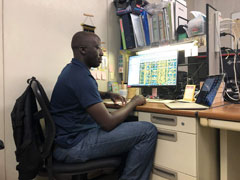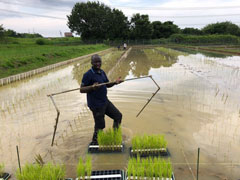Justine Kitony now works as a Research Officer at the Kenya Agricultural and Livestock Research Organization (KALRO). But prior to that, he went to Japan through the JICA Agriculture Studies Networks for Food Security (Agri-Net) scholarship for a two-year master's program in Crop Science, at Nagoya University. Subsequent to completion of this program, he returned to Nagoya University for a PhD in Agricultural Sciences. He sits down with us for a conversation about his time in Japan.
![[Figure]](/dsp-chair/english/dsp/story/ex-participants/uurjcd000000epjq-img/2022_02_02_01.jpg)
Name: Justine Kitony
Country of Origin: Kenya
Faculty and University: Nagoya University, Graduate School of Bioagricultural Sciences
Research Area/Theme: Plant breeding, Genetics, Agricultural science, Livestock research
JICA Course:Agri-Net
As a child, Justine Kitony always dreamed of going to Japan to study. "I used to observe JICA vehicles passing by in the countryside where I lived, and that sparked my curiosity about JICA and Japan as a whole". During the initial stages of his career in Kenya, he got a chance to work on a project in the field of agricultural sciences with Professor Makihara from Nagoya University. Through this project, he interacted with various Japanese scientists and was inspired to apply for the JICA scholarship to study international agriculture. "I finally fulfilled my childhood dream of studying in Japan after receiving the scholarship", says Justine.

Justine thoroughly enjoyed his time in Japan. Apart from spending time at the lab, working on plant genetics, he was involved in teaching students and going on field trips. "My project was centered around mapping new genes in rice populations. A new rice strain which is ideal for genetic analysis had been created by my professor and his research team. So, when I joined, I was able to dive straight into the analysis and identification of new genes in this strain", Justine explains.
He also got to interact with many international students across different universities, as well as local Japanese people, who would include him in local celebrations and events from time to time. "My life felt complete in Japan. It felt like I was at home", Justine says.
The JICA-DSP program in International Agriculture aims to provide graduate students with the ability to utilize outcomes from fundamental or basic agricultural research to social implementation programs on rural development in the tropics. In the long run, it aims to help humankind live in harmony with its environment.
Justine was highly inspired by these goals and with the prospect of applying his newly acquired skills and knowledge in the field of agriculture, to not just a niche region, but wherever required.
"I learnt the importance of being part of a large corporation with an international team, since it allowed me to contribute to solutions for problems which are faced by mankind globally", he says. He adds that most of the crises we face, such as climate change or hunger, are similar for everyone across the world and require a collaborative approach. Justine is thankful for the long-lasting and resourceful connections he formed with his peers during his time studying with the JICA-DSP scholarship. Through these experiences, he realized that his newly acquired skills in the field of agricultural biosciences can be beneficial for the development of agriculture in the African context as well, which led him to come back and work for KALRO, Kenya.

On coming back to Kenya, Justine began working at KALRO again, on multiple projects which were based on collaborations with Nagoya University and funded by the Japanese government.
"In Japan, we worked on some new rice strains that would lead to promising varieties of rice for cultivation. I am hopeful that these strains are approved and released in Kenya after being tested in national clinical trials", explains Justine.
He also emphasizes that the good lab practices he learnt in Japan were impeccable and help him set up procedures for experiments in KALRO. "Japanese people have a very meticulous and proper way of setting up procedures, which I am fortunate to have imbibed," adds Justine. "They are hardworking, innovative and disciplined. Working with them is a great way to acquire hands-on skills and learn not just about your specific field of work, but also the qualities that contribute to a successful life."
Today, Justine remains in touch with his colleagues and friends from Japan and discussions with them help him brainstorm ideas and solutions for problems that they all face in different parts of the world.
Justine does not hesitate to recommend JICA programs to prospective students.